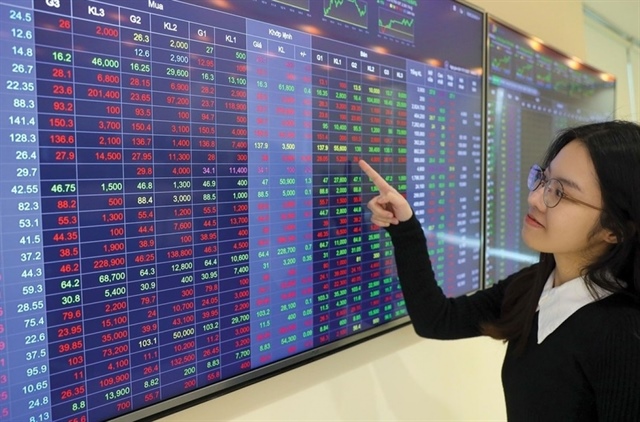Information deficit, new rule worries dampen shares
Information deficit, new rule worries dampen shares
The last trading week was sluggish because of a lack of supportive information and concerns over new regulations regarding financial institutions' capital adequacy ratio.

At the HCM City Stock Exchange, the VN-Index ended last Friday at 588.03 points, falling by two per cent week-on-week. Blue chips lost the most value as seen through the VN30 Index, which tracks the southern bourse's top shares or blue chips. It plunged by 7.8 per cent.
Meanwhile, trading value remained high at an average of VND2.5 trillion (US$117.9 million) on an average volume of 146.7 million shares.
At the Ha Noi Stock Exchange, the HNX-Index dropped by 1.76 per cent to 89.14 points. Trading value and volume averaged VND1 trillion ($47.1 million) and 73 million shares.
Selling pressure late in the previous week continued and drove share prices down. However, speculative investors still favoured property developers FLC, Tan Tao and Kinh Bac Urban City, as well as Quang Nam Rubber and Ocean Group in HCM City. They likewise favoured property developers PetroVietnam Construction, Sacomreal and Tasco, as well as retailer KLF and financial and insurance company FIT in Ha Noi.
Notably, FLC witnessed more than 50 million shares change hands on Thursday, a first in the market's trading history.
Last Friday, the State Bank of Viet Nam (SBV) announced a circular to tighten the safety ratios, cross holding and securities lending of credit institutions. The market tumbled before the circular was issued as sources had acknowledged about the ruling in advance.
According to the circular, domestic commercial banks and branches of foreign banks shall not offer securities credit of more than five per cent of their charter capital, compared with the previous regulation of 20 per cent.
Investors washed out shares over fears that margin lending would significantly decline. However, according to analysts, the ruling will bring benefits in the long term.
Last week, foreign investors were net sellers, unloading a net of VND347 billion ($16.3 million) and witnessing an increase of about 0.5 per cent in the US dollar exchange rate, although the SBV opposed the lifting of the foreign exchange rate.
At the end of the year, demand for imports is expected to increase as global gold price decreases, making dollars more valuable. In addition, according to Pham Hong Hai, HSBC Vietnam's deputy general director, the trade deficit lasted for two-and-a-half months and indirect foreign investment made a turn after the United States Federal Reserve terminated its quantitative easing programme.
Regarding the domestic stock markets, Nguyen Duc Hung Linh, Saigon Securities head of retail research and investment advisory, predicted the downtrend to continue and urged investors to purchase shares of PetroVietnam Gas and Vinh Son-Song Hinh Hydropower.
vir




























